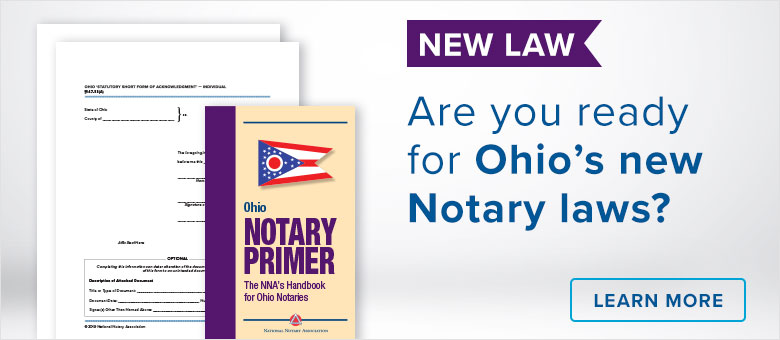 Updated 9-19-18. As of September 20, 2019, a new law is in effect in Ohio that implements significant changes for the state’s Notaries and those seeking to become Notaries. The new legislation is Senate Bill 263, the Notary Public Modernization Act.
Updated 9-19-18. As of September 20, 2019, a new law is in effect in Ohio that implements significant changes for the state’s Notaries and those seeking to become Notaries. The new legislation is Senate Bill 263, the Notary Public Modernization Act.
Key provisions of SB 263 include the following changes to Ohio Notary law:
- Updates to the way Notary commissions are obtained and renewed, including transfer of the commission process from the county courts of common pleas to the Secretary of State, requirements for education, testing and a criminal records check.
- Increases in the fees Notaries may charge.
- Rules for completing notarial certificates.
- Rules for becoming an “online Notary Public” and performing online notarizations (often called remote online notarizations, webcam notarizations or remote notarizations).
Administrative rules implementing the law’s provisions have also been finalized. However, any law of this significance is bound to raise questions. Here’s what you need to know.
How is the OH Notary commissioning process changing?
As of September 20, 2019 anyone applying for a new Notary commission or seeking to renew their commission will do so through the Ohio Secretary of State’s office.
Applicants for new Ohio Notary commissions who are not attorneys will be required to:
- Obtain a criminal records check that is not more than 6 months old at the time of the application.
- Complete a 3-hour education program and pass a test.
Attorneys applying for a new Notary commission in Ohio will be required to complete a 3-hour training program. They will not, however, be required to obtain a criminal records check or take a test.
Notaries seeking to renew their Ohio commissions will be required to:
- Provide an updated criminal records check that is not more than 6 months old at the time of the application.
- Complete a 1-hour education program.
All applicants will be required to pay an application fee of $15.
When can I start my commission renewal process?
You may complete your continuing education requirement up to 12 months prior to the expiration of your current commission.
Note: If you plan to renew your Ohio commission, make sure you do it before your existing commission expires. If you let it lapse, you will be treated as a new commission applicant and required to complete the 3-hour course and pass the test.
How do I get a criminal records check?
The Ohio Attorney General’s office has an arrangement with a private company to conduct records checks. The office has a list of locations and contact information on its website.
The cost may vary. Fees listed on the AG’s website typically range from $30 to $40, but you should ask the provider in advance.
If your records check reveals a disqualifying offense, the Secretary of State’s office will inform you that your application must be denied and you must not complete the education and testing program.
How do I complete the education and testing requirement?
The Secretary of State’s office has posted a list of authorized education and testing providers along with their contact information.
[Note: The National Notary Association is an approved education and testing provider for new and renewing Notaries.]
The rules stipulate a fee of $130 for the education program and test for new commission applicants who are not attorneys. The education fee for attorneys is $75.
For renewal applications, the fee for the 1-hour education program is $45.
What if I fail the test?
Under the rules, you must wait 30 days to retake it. If you wait more than 6 months from the date your criminal records check was issued, you will have to start the entire application process all over. If you fail the test a second time, you will have to re-start the application process including a new education fee.
What are the new fees for notarizations in Ohio?
As of September 20, Ohio Notaries may charge up to $5 for any in-person, paper notarization. This is a significant increase over the previous fee schedule. The maximum fee for an electronic notarization that is not performed online is $10. The maximum fee for a remote online notarization is $25.
Do I need to use different Notary certificates?
For acknowledgments, you have two options:
- You can use the “statutory short forms of acknowledgment” in existing statute, or
- You can create your own certificate wording, but the new law stipulates that it contains the words “acknowledged before me” or their substantial equivalent, and clearly states that an oath or affirmation was not administered.
For jurats, the new law includes a new statutory jurat form. If you choose to draft your own wording, it must clearly state that an oath or affirmation was administered.
Where can I get Notary certificates that comply with the new law?
There are several options:
- You can create your own following the requirements outlined in Ohio Revised Code Sec. 147.542.
- You can use the statutory short form certificates (see links above).
- You can purchase pre-printed pads of certificate forms from a vendor, such as the NNA.
- NNA members can download the certificate forms free at the My NNA area of NationalNotary.org.
How do I become an “online Notary Public”?
Anyone who is a commissioned Ohio Notary may apply to be an online Notary. To become authorized you must:
- Successfully complete a 2-hour education program and pass a test administered by an authorized provider.
- Pay the authorized provider a fee of $250.
- Submit your application to the Secretary of State and pay an application fee of $20.
If you fail the test, you may retake it but must wait at least 30 days after the date of your first test. However, you must retake the exam no later than 6 months after completing the education program. If you fail the exam a second time, you must re-start the authorization process.
Your authorization will last for the remaining term of your Notary commission.
